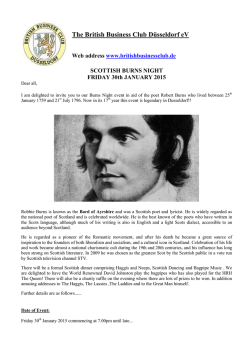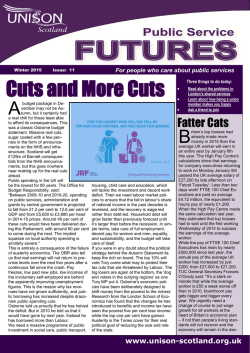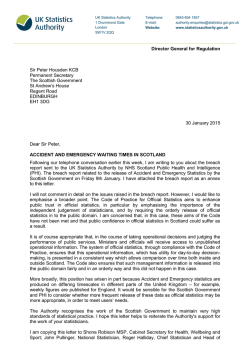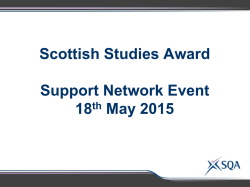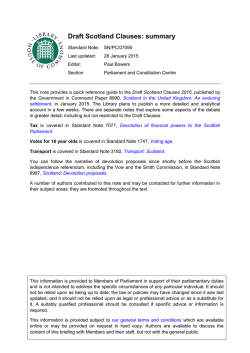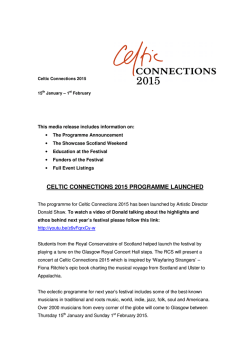
issue 2 - Northern Renewal
Dearest Scotland Friends, inspiring Scots and all round bad-ass dream team Sarah Drummond and Cat Cochrane formed Dearest Scotland to give a democratic opportunity to people to write a letter to the sort of Scotland they want to see. Bringing their tools across the country, they are using a creative and expressive approach to participation. They are planning to publish all the letters they receive in a book next year and showcase them in an exhibition at the Scottish Parliament. We caught up with Cat to pick her brains on the project. It actually started even before I met Sarah. It was her, Lauren and another lassie who was at Snook. They do service design in communities and were in a meeting with people in East Dunbartonshire, redesigning health services with them. They recognised that there were so many great ideas from just ordinary people, but no platform for it. They reckoned that the mainstream media isn’t interested in what people have got to say, politicians are only interested if there’s an election, and so this was really a needed platform for these really wise ideas coming from the grassroots. Sarah wanted it to be totally egalitarian and inclusive. Where everyone in Scotland, no matter what class, no matter where they’re from (we’ve had a lot of letters from Scots living abroad, in Canada and America) can get involved. From the ages of 6 right through to 106. At the end of the last year, in the year of the referendum, it was the time to ramp it up, and she asked me if I wanted to be involved with the work. I said brilliant, I love Dearest Scotland, and so that took us through from March when we had the launch in the Glad cafe. And since the launch we’ve just being doing events like the one at the Arches with the Common Weal and in cafes. Over the summer we did a wee bit of a tour and went to Dunkeld, Greenock, the Glasgow Women’s library - places like that. ’s been tricky because people love the idea of Dearest Scotland but see trying to get people to actually write their letter? It’s quite tough. In the year of the referendum, when everybody’s mind’s are a little bit open to the future of Scotland, we try to get them to not just write their letter about the referendum. It’s trying to think 10, 20, 30 years down the line to what Scotland could look like. What their version of Scotland could look like and maybe in 10, 20, 30 years we can look back, collate it and think “Oh thats a nice archive of what it was like thinking about the future of now”. When we have our workshops we have little prompt cards on the tables and we ask strangers to sit together to spark a wee bit of discussion so the prompts are things like: ‘What will a Scottish education look like in 2030?” “What will the future of a Scottish High Street look like?” Because of that, you get a nice selection of letters that are about education or about energy or about employment or about social justice, and we’re hoping to get enough so that we can actually put them into categories so the book could have the categories that readers could go straight to. When we publish the book, any money over and above publishing cost will go back into literacy projects in Scotland. I went to speak to our local MSP and the MSP that’s connected to my college, and they loved the idea of Dearest Scotland. They put forward a members debate motion which they had the other day in parliament. It’s contradictory because although we try to stay apolitical, it’s exposure and it gets people thinking. When we had the debate, suddenly a lot of teachers were getting in touch and asking if they could take it into the school’s curriculum. We’ve also had people getting in touch with us from India and Iran to ask for tools for Dearest India and Dearest Iran. My mum wrote a letter for example. In her letter she said that she want’s an independent Scotland because as far as she can remember everything that’s gone wrong has been blamed on the Tories and its time to just have a change and have a hand in our own affairs. Because at least if we fuck up, its by the work of a Scottish hand, and somehow that’s much better. And when I read her letter I cried, because I believe she is speaking for a whole generation of women. There’s a lot of letters that are like that: reflective about the future, because there are things that can be learned about the past that can take us forward. I’ve loved working on the project. It’s been a privilege to sit down and read the letters. They’re quite visionary. Published in Glasgow by Northern Renewal www.northernrenewal.com @renewal_north facebook.com/northernrenewal Borders features a range of work: from litho prints to scottish rap and in the languages of Scots, English and Gàidhlig. Featured: Loki and Black Lantern Music (interview) Elisaveta Maltseva Map Not To Scale (mixed media) Nikki Robson Thoughts of an ex pat (poetry) Samantha Jack Lino Cut (lino cut print) Find the template for your Dearest Scotland letter after unfolding the issue. Feel free to write your letter there, and either scan, photocopy or cut it out to send to Dearest Scotland, to be part of their historical archive. CONTENTS Michael Kelly Featured Cover Editors Editors’ note Marcas Mac an Tuairneir Nàiseantachd/ Nationalism (poetry) Alasdair Wallace Trickle Down (monotype print) John McGlade Far Right (poetry) Peter Stewart The BS Translator (script) Ann MacKinnon My Country (poetry) Features: Dearest Scotland (letters) Featured: Lateral North (Atlas, Interview) Simon Forsythe A Yes a Day (photography) Elyse Jamieson A Long Distance Relationship (prose) Ross McLeary A Tangerine Dream (short story) Loki Black Lantern Music We met Loki AKA Darren McGarvey and Bram from Black Lantern Music to discuss their collaboration on Loki’s upcoming album, GIMP, the crowdfunding campaign which made it all possible. Funders have already received their album, and it will be released for general sale after the Referendum. We chatted Hip Hop, privilege, imperialism and Sci-Fi D: It came about because me and Bram were talking from time to time. Bram was kinda supporting me with wee things and he became a go-to person for a bit of advice and I started to feel like, maybe I could go to Black Lantern and just partner with them. A: So you were building on what was already there? BORDERS. These invisible lines have long been challenged, erased, redrawn and redefined. To some, borders are a new territory of experience; the chance to delight in our differences. For others they are something to fear and to be fought over. Do these boundaries define our experience? Or in the digital age of global capitalism, where every high street looks the same, have they become irrelevant? As our wee patch of green shudders on the verge of change, Scotland is enlivened with creativity and debate. We are witnessing dialogue about the future of our country on a scale that Scotland has never seen. The debate on constitutional reform has brought a new gust of life not only into Scottish politics, but also the civic and creative life of the country too, empowering a range of new voices to emerge. We are thrilled to present some of these new voices in BORDERS. Democracy is not just something to have at the heart of our politics, but something to aim for in our own work too. With this in mind we invited issue one’s contributors to return as guest editors of issue two, and were grateful for their role in finalising the choice of works you see featured in this zine. Northern Renewal is unique in this cooperative approach to documenting Scottish arts, which belongs to no one exclusively, but is a community legacy. I: Wonderful. Ms. Wantoo, sorry for the delay, please continue. BS TRANSLATOR: (heavy Scottish accent) Alright there hey, is this junk on? I: Erm, goodday? Testing? SFX: Static stops. I: Almost there… hokum, nonsense, gobbledegook… aannnnddddd bullshit mode, activated. SFX: Fiddling with gizmo: beeps and static I: Oh, sorry to interrupt, Ms. Wantoo: it seems our listeners are having some troubles. Please stand by while we install our bullshit translator. DW: Certainly. You see, basic economic theory argues that - I: Thank you both for coming. Now, Dinah, I wonder if you could begin the discussion. You believe Scotland should remain part of the UK, yes? NODDIE CHANCE: Hello. I: And Mr. Noddie Chance, defending Scottish Independence. DINAH WANTOO: Good-day. I NTERVIEWER: Welcome back to Overview, examining the case for Scottish Independence. Here today we have Mrs. Dinah Wantoo, arguing the case for unity- THE TRANSLATOR From Marcas Mc’s Gàidhlig to Ann MacK’s Scots, a resident expat’s fears to the diverse faces of a Yes vote, the work featured in BORDERS captures the plurality of Scottish identity, exploring, as Elyse Jamieson does in ‘a long distance relationship’ whether this makes us different or the same, and whether this is the question we should be asking. A&K So in a way this works on two different levels: where people who don’t know about my stuff will get the story and for people who are fans and know all the details, I wanted it to be something that they could really enjoy and be excited about as well. It’s coauthored in a way because they’ve helped to create it. A: Is it like a confidence thing, you know, Nationally? B: The best science fiction is always very close to the present. I’ve been writing about Scottish hip hop for 10 years and I’ve always fervently believed that there would come a time when the Scottish accent in rap would become a selling point rather than a hindrance, and I don’t think we’re there yet, but I think we’re getting there. B: It was the ambition of the project that attracted me to it. Science fiction is one of my favourite things, and this is a dystopian spin on hip hop. Nobody had really done that in Scottish hip hop before - I think it’s the first Scottish Hip Hop concept album really. To tell a narrative over the course of a whole album, I can’t think of any other examples of that. DW: Ah, Thank you. As I was saying, it makes no economic sense for Scotland to leave the UK: Our production capability is limited, and we need the capital bulk of London traders. We need to engage with our Southern neighbours to forge a vibrant future. SFX: Brief burst of static BS TRANSLATOR: Look, we’re skint and on the dole. But Alan Sugar lives in London, right? So let’s go with Britain, should be good for a punt. I: Hm, excellent points, Ms Wantoo. Mr. Chance, do you wish to retaliate? Can Scotland provide a solution to the economic problem? NC: Well of course we can, you only need to look at our vast reservoirs of oil: the North Sea alone produces 950 000 m³ of the stuff every day – found in fault bounded anticlinal traps, you see – and with the rise of investment preemptive of Scottish Independence, contracting can only ever boom. SFX: Static, beeps. BS TRANSLATOR: Maybe because oil? I don’t know how oil works. Do YOU know how oil works? I don’t know how oil works. INTERVIEWER: Interesting, interesting. But both of you must admit that there’s more to independence than cold cash? NC: Of course... while we’re keen to avoid the isolationist nationalist narrative, BS TRANSLATOR: It’s no’ about William Wallace, NC: That, uh, that’s what I think voters should consider. I: Stop translating! END BS TRANSLATOR: Nobody knows nothing about anything and our country is doomed, I’m off for a drink and a fag. I: No, please don’t… Well, they’re off. I’m sure our audience will agree that some fascinating points have been made. SFX: Rustle as interviewees leave the studio. Slamming door. BS TRANSLATOR: Whinge, whinge, Haggis, whinge. NC: Yes, for once I agree with Dinah, I think he’s very unfair- BS TRANSLATOR: Whinge, whinge, Love Actually, whinge. DW: That’s it! I’ve had enough. Your translator is quite rude. BS TRANSLATOR: TOWIE and Royal Weddings and that. DW: (listening, starts to back-pedal in a panic). But, but - at the same time, it’s vital to remember that Scotland is a part of Britain, which has a vibrant culture. BS TRANSLATOR: All we got is David Bowie. DW: I’m – I believe that to deal with the psychological is a red herring, and we should- BS TRANSLATOR: Naw fair! Braveheart’s so cool! BS TRANSLATOR: Braveheart wants yer vote. BS TRANSLATOR: but it’s a wee bit about William Wallace. NC: we nevertheless insist that self-determinism is important. B: It’s an essential component of Hip Hop full stop. It’s a working class movement, it started in working class neighbourhoods. And I say that as someone who is very middle class and raps, I know that I can’t fully embody what it is to be a rapper. If you look at Hip Hop internationally it’s a working class movement and it will hopefully remain so. DW: I’ll have to interrupt you here, Noddie, as I think you’re telling a falsehood. D: To be honest, I would hope that. I mean, if I create something it’s mine until I put it out, then it’s up to whoever. I want to compete with the canon of Scottish History, I don’t want to compete with the other MCs. This album, is basically just a rebuttal to the way that they think Hip Hop should be done. I’ve made an album that sounds like its in the future, and it’s just Boom Bah! People talk about progression. What they’re really talking about is a change of style, I’m talking about pushing the boundaries of what you can actually write about. Look at it from what is ok to say, what is not ok to say, and that is what the real progression’s got to be. K: Do you ever fear that people could take this accent and these stories away from their context and giving a different meaning? K: Do you think that class associated authenticity becomes a prominent feature of the hip hop scene in Scotland? Real hip hop is about activism. The thing about hip hop is you can only watch it for so long before you want to participate in it. D: No because, the dialect is like a veil that the language is wearing so whatever’s in the language is what’ll get right through. So if its infused with something meaningful then it’ll connect. So it’s really trying to strengthen on this culture we’ve got at the moment in Hip Hop where people feel that they can be themselves and just about empowering people to do that. B: It’s that cultural cringe and I think Scotland’s stepping away from it, and it has been like that for decades. But to give credit where its due, within the hip hop scene, it has levelled up seriously in the past few years. It speaks for itself now. It doesn’t need anyone to come along and say its ok to have a Scottish accent. These people are building their own culture. K: Do you ever worry that Scottish Hip Hop would become twee? The notable thing about Dr Who is that if you jump into Dr Who then you can start from any point and engage with it and then you can learn all the backstory later. So what I’ve tried with Gimp is to do the same. I wanted to go back to some of my early music and find the stories that really connected with [fans] to work it into this. D: Becci got me into Dr Who, and it got me thinking about how you make time travel happen in a music thing, in audio. How could you actually create the sensation for the listener that they were being thrust forward through time? I started to click together that it was these different stories intersecting at different points. And when I started writing about it she said: “Do you know what this is like?” And she explained about Lanark, which I haven’t read. And then when I was describing it to the artist who did the front cover, Oliver, he says, “Oh like Lanark!” And it really struck me that this must be something that’s in the Scottish ether! A: Is there a Scottish connection with the Sci-fi stuff? It reminded me of Alasdair Gray’s Lanark so I wasn’t sure… D: The albums a dystopia that presents a future country that’s called New Glasgow. So Scotland? The name Scotland’s dropped, its just a big mega city in the central belt and the population’s been moved, so there’s 5 million people living in Glasgow and there is no Edinburgh! It’s just New Glasgow. The idea is like there’s a pillar in the middle where the professional class live and they live in there to protect culture from the slums. Tae be honest it’s no too far removed from what I’m experiencing just now in life anyway. D: Yes, it’s really helped me focus on just the writing, and commissioning the other visual artists to do different things to help tell the story more so the project exists on a lot of different platforms. The connection between art and politics is never more poignant than in moments of change. People in Scotland are energised by the referendum debate, and creatives are no exception. In its dedication to documenting the arts in Scotland, Northern Renewal is now turning to address this pivotal moment in our collective, creative experience of civic life. (believe me, i’m trying.) and because the former is less likely to accept the face printed on my fiver i am supposed to view this as different? at fifty miles south or sixty degrees north it was all doon sooth to me regardless of which side of The Borders you were on because a full degree didn’t so much as get me to Scotland. that sweeping generalisation is not seen as a tenable position here, or anymore, and yet i can swipe right and be dating someone in england just as easily as i could be dating someone in glasgow / there is, therefore, less than zero point one five of a latitudinal degree between my current location and An English Location. this also translates to approximately five hundred and fifty six (point six) miles north of the most southerly point of the united kingdom, but only approximately fifty miles north of the most southerly point of scotland. and while four degrees of separation may not seem very much for roughly one thousand eight hundred and twenty six days (give or take), this nine-point-eight-on-a-scale-of-one-to-ten northern person has lived at a latitude of approximately fifty six degrees north. / nae bad. and, you see, as someone who lived at that latitude of approximately sixty degrees north for approximately six thousand five hundred and seventy four days of their life, nine point eight felt, in both the grand british and scottish scheme of things the calculation of this figure was based upon a number of things – primarily, that at that exact moment, i was sitting in my parents’ house, in the middle of the sea, approximately fifty miles south of the most northerly point of both scotland and the united kingdom. i answered nine point eight. combine the quantitative and the qualitative and give a made up statistical reason which legitimises my otherwise entirely emotional point of view. not least that i have spent most of my life in a box And yet aw that is you is aye there, your brawness staps me wi wantin but insteed o the canny accepin o yir scuffin there’s a new lifie in yir step. a long distance relationshiP but i was trying to impress and when posed with these sorts of problems i like to do what i like to think i do best: i found the question problematic for many geographical and perceptual reasons i was once asked, on a scale of one to ten. “how northern are you?” Hatred Of people you never met. Pride In things you didn’t make. Nationalism Thoughts of an ex pat I left the border balaclava’d behind me. An imaginary line my teacher said, but its real shadow daubed slogans on our walls, shot division through neighbours, demanded we define ourselves in painted kerb and brandished flag. That border turned me immigrant. I am conflicted by the threat of another, redrawn an unsettled settler. Far Right Is it just us of has Scotland got that creative tingle? But there’s a split-new teuchness in yer grasp, a haud that’s nae sae supple. Like weel kent auld shin, you rowe your hairt aboot me. You haud me tae ye. My Country Gràin Air feadhainn nach do thachair riut a-riamh. Pròis À rudan nach d’ rinn thu. Nàiseantachd A Tangerine Dream It was clear the end was nigh when, in the year of our lord 2015, Dundee United won the UEFA Champion’s League. Even though the fans of Manchester United, Real Madrid and Bayern Munich had watched their teams lose one by one, it was only after the match ended that they saw that the final whistle for humanity had blown. It was a flagrant, ridiculous result. The devil’s work. Football fans across the world united in protest. This would not stand. Protest camps appeared in every major city across the globe. Demonstrations and sit in protests occurred in London, Manchester and Edinburgh. Xabi Alonso went on hunger strike. Wayne Rooney started a petition on Change.org. It only truly began to escalate towards the end of the first week when headlines like “Arabs Dominate Europe: Protests Escalating Daily” went viral across the Atlantic. America would not stand by and let this happen. The United Kingdom parliament sought to de-escalate events but were told to butt out. The Scottish Government, feeling that this was a devolved matter, stood in unflinching solidarity with their nation’s finest footballing success in decades. With Dundee they would remain united. They would stand with their Arab brothers. This inflamed America further. Seeing no other option, America declared war on Dundee United. The invasion was a delicate operation to organise. Whilst having a distinct, numbers advantage (The United States Army outnumbered Dundee United by about 22572 to 1), the United States army moved cautiously: they were acutely aware of the impressive youth development system successive managers had overseen in the last decade. They were also aware that traditional camouflage was rendered useless on the vibrant orange and black terrain. Only when the US Army dropped their nuclear payload above Tannadice did they realised how prepared Dundee United were. As the bomb reached ground level the stadium rolled forward, the bomb deflected off a laser shield and limply rolled down the offside of the building, disappearing forever. Shortly after, Dundee United released a statement through a blindfolded and confused Jim Delahunt. “If you do not cease your aggression we will be forced to deploy Jackie McNamara.” Brian Taylor of the BBC secured an interview with a balaclaved man who only referred to himself as a Tannadice Trendy. “So. Can you tell us, does Dundee United have nuclear capability?” The Trendy stared at him in stolid silence for 30 seconds before replying, “I’m no gonnae answer a stupid question like that.” Behind closed doors peace talks were arranged. The President of the United States of America was keen to see a resolution after their miscalculation with the bomb. In the interest of fairness they agreed to meet on a mega-yacht in the North Atlantic ocean, equidistant between Tannadice and the White House. The President, nervous but keen to come out of the whole situation looking strong, spoke of cooperation, of new-found respect. Of the desire for both sides to resolve their differences peacefully. Two weeks later, on board the HMS Jim McLean, the President sat waiting at an official dinner for the Dundee United ambassador to show. At exactly a quarter to three in the afternoon, in international waters, the HMS Jim McLean sank to the bottom of the ocean. No one survived. “Sacrifices had to be made,” came the cryptic public statement from the Dundee board. In an unusual national address, the Vice-President announced they were updating their Axis of Evil. Iraq. Iran. North Korea, Tannadice Park. The following morning, Dundee vanished under a cloud of smoke. A week later, when the smoke cleared, Tannadice Park was gone. All that remained was a giant orange and black hole in the ground filled to the brim with Mitre products. Mainly footballs. Five hours later an unusual signal came from an unusual location and the signal was broadcast live to the world. The picture flickered for a few seconds before they saw Jackie McNamara stood before a series of elaborate computers and touch-screen panels. Behind him, drawing the eye far stronger than his chiselled good looks, was a window filled with stars. It was only at this stage that the Secretary of Defence combed over the data and realised that there weren’t even any Arabic players in the first eleven at the time and that the whole thing had been an elaborate misunderstanding. Nonetheless, nobody had uncovered any intelligence suggesting Dundee United had an operational space program. “In the name of Paul Hegarty, we leave this place. Finn Døssing, watch over us all. We take the next step forward. The next big step for Mankind, for Scottish Football: Dundee United in Space.” And with that, they were gone. Aren’t Americans awful? Always driving On the wrong side Of the world My idea with it was to try and create something that was compelling enough that someone who didn’t understand Glaswegian would learn it. It was just to try and invert the traditionally imperial way of looking at it which is: drop your accent if you want to get anywhere in life. Renounce who you are, and a lot of people have done great out of that, but I think there’s a strong argument to be made for retaining your identity in that it diversifies global culture and that makes things more rich and real. Its very subtle, but it’s a big, serious thing when you cognitively renounce your identity and automatically speak American the first time you try to rap. It really begs the question, what else do we do automatically? That we don’t think? And that’s what I’m really trying to get to underneath the argument about accent, its not really about rap its about the mechanics of imperialism. 08/09/2014 12:52 Borders Indesign.indd 1 200MW 50MW 50MW 50MW 200MW 100MW 100MW 20 50 KM PRODUCED BY AN AUTODESK EDUCATIONAL PRODUCT PRODUCED BY AN AUTODESK EDUCATIONAL PR HYDRO POWER PERCENTAGE OF EUROPE’S WIND RESOURCE FOUND WITHIN SCOTLAND OFFSHORE WIND ONSHORE WIND PEAK ENERGY REQUIREMENT OF SCOTLAND 10.5GW WIND ENERGY CAPACITY OF SCOTLAND 159GW ONSHORE WIND PEAK ENERGY REQUIREMENT OF SCOTLAND 10.5GW WIND ENERGY CAPACITY OF SCOTLAND 159GW ENERGY POTENTIAL Scotland has a natural abundance of renewable energy potential. Will it also be at the forefront of renewable technology development, creating institutions to educate and to develop future renewable technologies? Could the mass of renewable energy potential enable students to test realistic prototypes across Scotland? WAVE & TIDAL SCOTLAND’S SHARE OF EUROPE’S TIDAL ENERGY 25% SCOTLAND’S SHARE OF EUROPE’S WAVE RESOURCE 10% WAVE & TIDAL SCOTLAND’S SHARE OF EUROPE’S TIDAL ENERGY 25% SCOTLAND’S SHARE OF EUROPE’S WAVE RESOURCE 10% Can tourism and energy production work simultaneously alongside one another in a future Scotland? LEGEND PEAK TIDAL FLOW 2-4M/S TIDAL FLOW 0.75 -2 M/S NRIP SITES PRODUCED BY AN AUTODESK EDUCATIONAL PRODUCT Contains Ordnance Survey data © Crown copyright and database 2013 CROWN ESTATE SOURCES: BRCC, 2011 10GW GENERATING CAPACITY PLANNED FOR SCOTTISH WATERS 25% POSSIBLE NO OF +5MW SCHEMES AVAILABLE IN SCOTLAND 7,000 TOTAL HYDRO GENERATION CAPACITY IN SCOTLAND 1.5GW SCOTLAND TIDAL ENERGY POTENTIAL 100 KM TRANSVERSE MERCATOR PROJECTION 1:2,000,000 0 10 0 0 1 1 6 5 4 3 1 2 0 9 8 7 6 5 4 3 1 2 0 9 8 7 6 5 4 3 1 2 0 9 8 7 6 5 4 3 7 6 5 4 3 1 2 0 9 8 7 6 5 4 3 1 2 0 9 8 7 6 5 4 3 1 2 0 9 8 7 6 5 4 3 1 2 0 2 2 3 3 4 4 5 5 6 6 7 7 8 8 9 9 0 0 1 1 2 2 3 3 4 4 5 5 6 6 7 7 8 8 9 9 0 1 1 2 2 3 3 4 4 5 5 6 6 7 7 8 8 9 9 0 0 1 1 2 2 3 3 4 4 5 5 6 6 7 7 8 8 9 9 0 0 1 1 2 2 3 3 4 4 5 5 6 6 Post Code 7 7 8 8 9 9 0 0 1 1 2 2 3 3 4 4 5 5 5 6 3 4 1 2 9 0 8 7 5 6 3 4 1 2 9 0 8 7 5 6 3 4 1 2 9 0 8 7 5 6 3 4 1 2 9 0 8 7 5 6 3 4 1 2 9 0 8 7 5 6 3 4 1 2 9 0 8 7 5 6 3 4 1 2 9 0 8 7 5 6 3 4 1 2 9 0 PRODUCED BY AN AUTODESK EDUCATIONAL PRODUCT T: And kelp is used in just about everything, toothpaste, pharmaceuticials, fertilizer, food. G: The projects are to provoke. To a certain extent we don’t believe any of them will happen on the large scale. I mean, are you going to have a 30 berth container terminal in Orkney? Probably not, but its nice to think about the possibilities. T: I think it would be nice to see something that we’ve done in the Atlas happen in real life. That’s actually helped people to develop something that’s beneficial to their community specifically. That would be a landmark. K: And what would be your final goal? Your success? T: The Hebridean islands and the Orkneys are two very specific case studies and essentially, we could do this for every single community in Scotland. Looking at all these places in more detail. The limits of what Scotland can do is unbelieveable - people need to know what’s on their doorstep. G: In Orkney alone there’s so much untapped potential among many industries, this is just one. I suppose the Atlas was about the potential of the whole of Scotland. Its looking at everything that we wanted to look at. A: So in terms of untapped potential for scotland, what kind of scale? PRODUCED BY AN AUTODESK EDUCATIONAL PRODUCT G: Well the Orkney project was because we asked the question: ‘Is Scotland a Nordic country?’ The Orkney and Shetland islands had the biggest relationship with these countries. And when we researched the islands, we found this proposal for a container terminal in Orkney, and we realised that this would be the place. So it informed the research. And everything started to fit into place. The proposal was to put one berth for a ship, so it was absolutely tiny. We started to find out why it was proposed for there, and it was because of new trading routes through the Arctic. We visited and heard that the population of Orkney would rise by like 5%. And we took that and said, well let’s imagine it rose by 500%. And then immediately when you do that, even though its just a number, it gives you more interesting architectural possibility, and even if that doesn’t happen it’s at least provoking people into thinking what things could be like. K (To G): So why Orkney? A: And independence is a redesigning in itself K: So to go back to the original project, Hebrides and Orkney. Is that indicative or where you guys come from? G: But your project was also informed by your time in Sweden T:Yeah I saw a lot of parallels between the Swedes and, particularly with the people in the Highlands and Islands, historically anyway. Obviously, they’ve built themselves up along the coastline, and that’s what all these small communities used to do. Piers were the center of these communities. And these piers are still physically at the centre, but they are disregarded. So our project was a series of interventions to keep the pier active throughout the 12 months of the year, so you could bring some consistency to the direct communities that were there, and to try and hem the flow of people leaving. K: What kind of interventions? T: For example, in a small bay on Harris we had a sailing school which obviously generated springsummer-autumn activity. And perhaps when its not so busy, we’re looking to transform it into a mussel farm. During the inactive months, the structure that holds the sailing school is a farm as well, so it has another function. We look at multifunctionality and adaptability in all that we do. YES A DAY Other data submitted (Occupation, Email and Post Code) will only be used to produce statistics on our reach and for us to continue to contact you. If you are happy for us to contact you, please tick this box Do you grant us a non exclusive, royalty free, worldwide license to use your letter in the following outputs: On dearestscotland.com In a Dearest Scotland book To 3rd party outlets like the media and magazines Is believed to infringe on copyright, trademark or other intellectual property, disclose or provide information protected under any law, or agreement, be discriminatory, unlawful, tortuous, obscene, fraudulent,defamatory, harmful, threatening, pornographic, indecent, vulgar, harassing, discourteous, hateful, abusive or racially, ethnically, religiously, sexually or otherwise offensive. 1.2 Dearest Scotland expressly disclaim any and all liability in connection with any content. Dearest Scotland will always attempt to publish in good faith that published content does not break any of the above decency standards and is owned wholly by the submitter. Cafe and Venue on the southside www.thegladcafe.co.uk 0141 636 6119 1.1 You agree that Dearest Scotland have the sole right to not publish your letter if they so wish to if it breaks any of the following decency standards: The Glad Cafe Dearest Scotland is a not for profit, A-political initiative and is seeking to create a crowd sourced vision for Scotland. Granting us a license to use your letter in the above will allow us to take this mission further. You accept the Terms and Conditions above in sections 1.1 - 1.2 In his project ‘A Yes a Day’ photographer and filmmaker Simon Forsythe brings together his two great passions: independence and photography. Between the 1st of June and the referendum, he set out to capture a portrait a day of a person who is in favour of Scottish Independence, and in doing so to document the different nationalities that live here and call Scotland home. Also part of the Documenting Yes project, Simon’s projects have taken him up and down the country as he travelled to the Isles of Harris and Lewis and through Ullapool in search of Yes’s. Not that he has to travel so far: “Finding Yes supporters wasn’t the challenge, the challenge was actually approaching and speaking to people I had never met.” Simon says (noting that it normally took him about 5 minutes to find a Yes supporter), “ the amount of support for Independence is inspiring.” The resulting work is a series of optimistic and thoughtful portraits that convey the deep conviction of many Scots for independence across age, gender and race. If you are happy to submit your letter but would prefer to stay anonymous, please tick this box We can help you can tailor an ad to suit any budget, just give us a shout on info@ northernrenewal.com to find out more. Data you submit above will not be shared with exception of first name, age and area/location which will be published alongside your letter. If you are happy for us to share these details alongside your letter, please tick this box We distribute zines to key venues in Scotland, and as far as Melbourne, New York and Chicago. How did you hear about us? Want to advertise in NR? Email With special thanks to our guest editors Claire Barclay, Anton Zhyzhyn, G: Yeah, look at kelp farming. If you look before the highland clearances, more than 60% of their diet was kelp. It was huge then, and after the clearances that whole industry died. A: For example with offshore farming. 0 PRODUCED BY AN AUTODESK EDUCATIONAL PRODUCT We want to collect a few details so that we can map where our letters come from and we can credit your input to the collective vision of Dearest Scotland G: Okay so for example with a fish farm, they’re known for releasing pollutants into the water, but if you pair this with a kelp farm, which absorbs pollutants, you have them both working in synergy. T: Symbols of capitalism. G: Yeah, and instead it should be like, [lateral hand gesture]. K: So capitalism is vertical and socialism is horizontal? T: Yeah and hopefully in an independent Scotland land will be cheaper, and so horizontal can be everywhere. Maybe. G: Socialism can’t afford vertical! It has to be horizontal! T: As Masters go, its a sentence that starts as an idea, and you build it from there. It was quite useful that Graham had such a large scale project, and I looked at a series of smaller interventions and it was the conglomeration of these ideas that created something new again. T: Where I come from, yes. I’m originally from Harris. I was born and brought up there until I was five and then moved to a small village near Inverness and stayed there until I was of age to go to university and I’ve been in Glasgow since. G: We are looking at branding and slightly more controversial projects. Like something that’s selfinitiated is a project around a Scottish Embassy in Brazil after a Yes vote. We have four Brazilian interns working for us at the moment, and it made sense because they know their own culture. A: Why Brazil? Because of the interns? G: It sort of started off like that but things fit into place quite well. It just happens that the Brazilian embassies are all in Brazilia, and Brazilia, from an architectural point of view, is a planned city and all the embassies are in the same place. If you go anywhere else, London or Edinburgh, they’re all dotted around the city, there’s no coherence to them. If you look at the street we chose, there’s Norway, Sweden, Finland and Denmark all sitting next to one another, and then there’s a big plot of land lying empty. A FEW DETAILS... G: An opportunity to break from the norm. London is a megopolis filled with these massive towers. G: We were talking about this last night like the UK embassy is right next to America. You know the UK is still a small country hitting above their weight, with these huge imperial powers. We think that Scotland should be amongst a different family of nations, and to have the embassy be among them, to have a totally different dynamic to it. 9 1/3 John McGlade is a freelance writer from Glasgow. He performs his own poetry and short stories around the country. He also scripts comedy material for television, radio and theatre productions. Peter is Irish, and writes comic sketches and short stories. He moved to Scotland three years ago, which means he can vote in the referendum but does not understand all the issues. However, he believes he is not alone in this regard. He has written a commercial for Glasgow which was aired on MTV, published one short story, and wrote the short film “Pictures and Perspectives.” Elizaveta Maltseva creates large works on paper with a non-linear narratives. She uses a self-developed digital photographic monoprint process and often works a drawn layer into the image post printing. She prints photographs of fleeting moments, broken dreams and obscured realities, and creates works that look like faded memories. http://www. elizavetamaltseva.com/ http://instagram.com/ didiandstories Elyse Jamieson is a postgraduate research student in linguistics, originally from Shetland and currently living in Edinburgh. Sometimes she writes things, which are most often somewhere in between poetry and prose. She also tweets a lot. Samantha Jack’s practice exists as an exploration of the relationship between art, activism and technology. Through a variety of politically motivated mixed media works and socially engaged art projects she discusses, visually and dialogically, the notion that art is activism. www. samanthajack.co.uk G: I suppose scale is a really good point to our idea. It’s not just Scotland, it’s down to towns and cities. Art installations in communities like the Gorbals and then to the Arctic scale of our geographic position. It’s to get people thinking differently about architecture: it’s not just housing extensions, it can be a feasibility study about how you move people around, why they happen to be there etc. K: And it’s hard to make a second move when your first move was so big. Do you have an idea of what that might be? K: Was that the goal at the start? G: But then we didn’t want to just restrict ourselves to the islands, and so we thought right, let’s just do the whole of Scotland, as a project. We looked at Scotland’s place within the Nordics and within the Arctic, to have a different perception of Scotland. T: Myself and Graham finished our Masters course here in June so, it was from a postgraduate diploma. I looked at the outer Hebrides and a series of small, architectural interventions in the community, and Graham looked at a shipping container in the Orkneys. K: So first question; talk to us about LN and why you started it up. Inspired by their Atlas of Productivity, we caught up with Lateral North (Graham Hogg and Tom Smith) to hear about what inspired the project and to chat about their future plans. Lateral North Michael Kelly is interested in trying to occupy and articulate authoritarian aesthetics. He is not concerned with limiting himself to specific materials, but instead tries to playfully change an aesthetic’s variables using whatever materials it makes relevant. He’s also a freelance Graphic Designer, Illustrator, and Lecturer living and working from Muirkirk, Scotland. PRODUCED BY AN AUTODESK EDUCATIONAL PRODUCT 10 10GW GENERATING CAPACITY PLANNED FOR SCOTTISH WATERS 25% PERCENTAGE OF EUROPE’S WIND RESOURCE FOUND WITHIN SCOTLAND OFFSHORE WIND 200MW 0 400MW 200MW PENTLAND FIRTH & ORKNEY Dearest Scotland, Ross McCleary is a writer from Edinburgh. His work has appeared in Valve, Dactyl and Spontaneity amongst others. He also writes semi-regular pieces of football flash fiction for http://www. chutneyexhibition.com/. He doesn’t support Dundee United. Ann Mackinnon is this year in receipt of a New Writers’ Award from the Scottish Booktrust. Her task is to gather together a collection of poems in Scots. My Country is one she wrote in the year of the referendum. Alasdair Wallace studied Fine Art Painting at Glasgow School of Art between1987 and 1991. Wallace lives and works in Glasgow and exhibits regularly in London and Glasgow. He has won numerous awards including the prestigious Noble Grossart Painting Prize in 2001. Alasdair’s work can be seen at the Glasgow Print Studio in the Merchant City. Marcas Mac an Tuairneir was born in York and educated at the University of Aberdeen and Glasgow Caledonian University. His debut collection, Deò, was published last year and it’s follow up, Guirmean, is expected next year alongside his début novel. www.marcasmac.co.uk d e a r e s t s co t l a n d .co m #dearestscotland Can strategically-placed offshore wind developments generate sufficient energy to meet domestic and industrial demands? 1.5GW TOTAL HYDRO GENERATION CAPACITY IN SCOTLAND 7,000 POSSIBLE NO OF +5MW WATERS SCHEMES AVAILABLE IN 1:1,000,000 SCOTLAND HYDRO POWER 200MW CED BY AN AUTODESK EDUCATIONAL PRODUCT I’ve sat with, and intermittently poked at this piece for a few years. It came to be a kind of unofficial brand for my student blog, and developed as I passed through art school. It brings together my own performance and graphite drawing, with pressed plant life from Linlithgow and Skye, textured with representations from my interest in science (the Cosmic Microwave Background, the first line of code from the Human Genome Project, and Koch Snowflake fractals). K: That’s pretty symbolic. A r e a ( To w n , V i l l a g e , C i t y n a m e ) 0–4 5–9 10–14 15–19 20–24 25–29 30–34 35–39 40–44 45–49 50–54 55–59 60–64 65–69 70–74 75–79 80–84 85–89 90+ Lucian Moriyama, Shona McCombes, Stephen Watt and Craig Allan. Occupation Age GUEST EDItoRS Male Female Other Name While I set out to playfully deconstruct a symbol of the British state, I feel these traces of its ultimate development can speak to both sides of the current debate. As I see it, it may be apprehended both in terms of an adaptive, if radical moment of a continuing structure - and a bursting out of given confines that may rupture and even destroy its vessel in the process. To p F l o o r 1 5 1 Ba t h St r e e t Glasgow G 2 4 SQ 08/09/2014 12:52 Borders Indesign.indd 2 WRITE TO THE FUTURE OF SCOTLAND As a space for performing and recording my self reflection, I feel it helped move my point of view from a Euclidean to a fractal appreciation of space - as well as my beginning to think of objects and their spaces in terms of relationships, as well as discrete parts. Although this kind of reflection is ongoing, I feel that the piece has reached its conclusion, and that it’s time to put it out of my hands. DEAREST SCOTLAND Nikki Robson enjoys capturing life in poetry and holds an MLitt in Writing Practice and Study from the University of Dundee. From Northern Ireland, she lives in Kirriemuir with her husband and 3 children. PRODUCED BY AN AUTODESK EDUCATIONAL PRODUCT Michael Kelly on the cover... PRODUCED BY AN AUTODESK EDUCATIONAL PRODUCT PRODUCED BY AN AUTODESK EDUCATIONAL PRODUCT
© Copyright 2026
